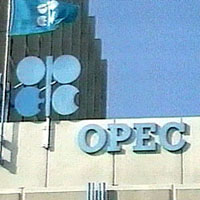OPEC to Keep Its Supply Curbs Unchanged
Iraq’s plan to increase oil output with the help of foreign companies may upset the Organization of Petroleum Exporting Countries’ efforts to support prices. The country has no quota to limit its production.

Oil companies including Royal Dutch Shell Plc, BP Plc and OAO Lukoil may help Iraq meet a target to boost oil output capacity to 12 million barrels a day in the next six years after winning oil licensing rounds earlier this year.
Oil has gained 64 percent since the beginning of 2009, when OPEC output cuts agreed late last year took effect, and is currently at about $73 a barrel. The group left production targets unchanged today at a meeting in Luanda, Angola.
“In the next couple of years Iraq is expected to come back with more oil and obviously it needs the other members to make space for them,” Johannes Benigni, chief executive officer of JBC Energy, said in a Bloomberg Television interview. “With prices at $75 everyone is happy and no one needs to touch the hot iron, but down the line, obviously, everyone sees this issue coming up,” Bloomberg reports.
Meanwhile, the OPEC wrapped up its meeting Tuesday in the Angolan capital by deciding that the best plan of action was not to act. The 12-member bloc highlighted concerns about the strength of the global economic recovery, and again called on oil producers outside the group to cooperate in propping up oil markets.
The lack of action appears meant to avoid shocking an oil market in which crude prices have stayed within range of OPEC's unofficial target of $75 a barrel for months. The relative price consistency has provided OPEC a measure of relief after oil demand and prices collapsed last year amid the world's worst recession in over six decades.
OPEC, explaining its decision to hold output steady, said in its final statement that "it is not yet clear how strong or durable the recovery might be." It stressed, however, that its members were ready to "respond to any developments which might place oil market stability and their interests in jeopardy."
Oil futures edged down to nearly $73 per barrel shortly after OPEC's decision — still within the threshold with which kingpin Saudi Arabia and other members has argued was fair for both producers and consumers, The Associated Press reports.
It was also reported, U.S. crude oil futures slipped on Tuesday, pressured by the stronger dollar and following OPEC's decision to keep output targets steady. "OPEC was expected and is neutral to bearish near term. The market expects compliance to continue to go down. If the dollar continues to rally, maybe that will be the impetus for the market to push lower," said Mike Lebow, analyst at MF Global.
The dollar rose to its highest level in nearly two months against the yen as U.S. bond yields rose on expectations for U.S. economic growth. The euro also slipped against the greenback, hovering near a 3-1/2-month low, after U.S. ratings firm Moody's cut Greece's debt rating.
OPEC agreed to keep its supply curbs unchanged but seeks to improve compliance with targets, Reuters reports.
Subscribe to Pravda.Ru Telegram channel, Facebook, RSS!





